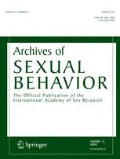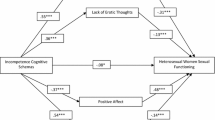Abstract
The association between cognitive schemas activated during sexual events and sexual functioning was studied. A total of 376 participants (47 women and 49 men with a DSM-IV diagnosis of sexual dysfunction and 160 women and 120 men from a control group) answered the Questionnaire of Cognitive Schema Activation in Sexual Context, the International Index of Erectile Function, and the Female Sexual Function Index. Results showed that participants with sexual dysfunction activated significantly more negative schemas when exposed to sexually unsuccessful situations compared to sexually healthy individuals (after controlling for the frequency of negative sexual events experienced by both groups). Most men and women with sexual difficulties interpreted negative sexual events according to an incompetence self-schema (I’m powerless, I’m incompetent, I’m a failure). These findings were congruent with recent research indicating the tendency shown by individuals with sexual dysfunction to give attributions of an internal, stable, and global nature to negative sexual experiences. Overall, results suggest specific faulty cognitive constructions underlying sexual dysfunctions and encourage the development of models and treatment approaches based on cognitive theory.
Similar content being viewed by others
References
Alford, B. A., & Beck, A. T. (1997). The integrative power of cognitive therapy. New York: Guilford Press.
American Psychiatric Association. (1994). Diagnostic and statistical manual of mental disorders (4th ed.). Washington, DC: Author.
Andersen, B. L., & Cyranowski, J. M. (1994). Women’s sexual self-schema. Journal of Personality and Social Psychology, 67, 1079–1100.
Andersen, B. L., Cyranowski, J. M., & Espindle, D. (1999). Men’s sexual self-schema. Journal of Personality and Social Psychology, 76, 645–661.
Barlow, D. H. (1986). Causes of sexual dysfunction: The role of anxiety and cognitive interference. Journal of Consulting and Clinical Psychology, 54, 140–148.
Basson, R. (2005). Women’s sexual dysfunction: Revised and expanded definitions. Canadian Medical Association Journal, 172, 1327–1333.
Beck, A. T. (1996). Beyond belief: A theory of modes, personality and psychopathology. In P. M. Salkovskis (Ed.), Frontiers of cognitive therapy (pp. 1–25). New York: Guilford Press.
Beck, J. S. (1995). Cognitive therapy: Basics and beyond. New York: Guilford Press.
Cappelleri, J. C., Rosen, R. C., Smith, M. D., Mishra, A., & Osterloh, I. H. (1999). Diagnostic evaluation of the erectile function domain of the International Index of Erectile Function. Urology, 54, 346–351.
Carey, M. P., Wincze, J. P., & Meisler, A. W. (1993). Sexual dysfunction: Male erectile disorder. In D. H. Barlow (Ed.), Clinical handbook of psychological disorders: A step by step treatment manual (2nd ed., pp. 442–480). New York: Guilford Press.
Cyranowski, J. M., Aarestad, S. L., & Andersen, B. L. (1999). The role of sexual-schema in a diathesis-stress model of sexual dysfunction. Applied & Preventive Psychology, 8, 217–228.
Cyranowski, J. M., & Andersen, B. L. (1998). Schemas, sexuality and romantic attachment. Journal of Personality and Social Psychology, 74, 1364–1379.
Cyranowski, J. M., & Andersen, B. L. (2000). Evidence of self-schematic cognitive processing in women with differing sexual self-views. Journal of Social and Clinical Psychology, 19, 519–543.
Leiblum, S. R. (2001). Commentary: Critical overview of the new consensus-based definition and classification on female sexual dysfunction. Journal of Sex and Marital Therapy, 27, 159–168.
McCarthy, B. W. (1986). A cognitive-behavioral approach to understanding and treating sexual trauma. Journal of Sex and Marital Therapy, 12, 322–329.
Nobre, P. J., & Pinto-Gouveia, J. (2003). Sexual modes questionnaire: Measure to assess the interaction between cognitions, emotions and sexual response. Journal of Sex Research, 40, 368–382.
Nobre, P. J., & Pinto-Gouveia, J. (2006a). Dysfunctional sexual beliefs as vulnerability factors to sexual dysfunction. Journal of Sex Research, 43, 68–75.
Nobre, P. J., & Pinto-Gouveia, J. (2006b). Emotions during sexual activity: Differences between sexually functional and dysfunctional men and women. Archives of Sexual Behavior, 35, 491–499.
Nobre, P. J., & Pinto-Gouveia, J. (2008). Differences in automatic thoughts presented during sexual activity between sexually functional and dysfunctional males and females. Journal of Cognitive Therapy and Research, 32, 37–49.
Nobre, P. J., & Pinto-Gouveia, J. (in press). Cognitive schema activation in sexual context: A questionnaire to assess cognitive schemas activated in sexual failure situations. Journal of Sex Research.
Nobre, P. J., Pinto-Gouveia, J., & Gomes, F. A. (2003). Sexual dysfunctional beliefs questionnaire: An instrument to assess sexual dysfunctional beliefs as vulnerability factors to sexual problems. Sexual and Relationship Therapy, 18, 171–204.
Rosen, R. C., Brown, C., Heiman, J., Leiblum, S., Meston, C., Shabsig, R., et al. (2000). The Female Sexual Function Index (FSFI): A multidimensional self-report instrument for the assessment of female sexual function. Journal of Sex and Marital Therapy, 26, 191–208.
Rosen, R. C., Leiblum, S. R., & Spector, I. (1994). Psychologically based treatment for male erectile disorder: A cognitive-interpersonal model. Journal of Sex and Marital Therapy, 20, 67–85.
Rosen, R. C., Riley, A., Wagner, G., Osterloh, I. H., Kirkpatrck, J., & Mishra, A. (1997). The International Index of Erectile Function (IIEF): A multidimensional scale for assessment of erectile dysfunction. Urology, 49, 822–830.
Sbrocco, T., & Barlow, D. H. (1996). Conceptualizing the cognitive component of sexual arousal: Implications for sexuality research and treatment. In P. M. Salkovskis (Ed.), Frontiers of cognitive therapy (pp. 419–449). New York: Guilford Press.
Weisberg, R., Brown, T., Wincze, J. P., & Barlow, D. H. (2001). Causal attributions and male sexual arousal: The impact of attributions for a bogus erectile difficulty on sexual arousal, cognitions and affect. Journal of Abnormal Psychology, 110, 324–334.
Weissman, A., & Beck, A. T. (1978). The dysfunctional attitudes scale. Unpublished manuscript.
Wiegel, M., Scepkowski, L., & Barlow, D. (2007). Cognitive-affective processes in sexual arousal and sexual dysfunction. In E. Janssen (Ed.), The psychophysiology of sex (pp. 143–165). Bloomington: Indiana University Press.
Young, J., & Brown, G. (1989). Schema questionnaire. Unpublished manuscript, Cognitive Therapy Center of New York.
Acknowledgment
The study was partially supported by a grant from the Portuguese Government (PRODEP). The authors would like to thank to Allen Gomes, M.D., Hospitais da Universidade de Coimbra, Portugal, for making possible the collection of the clinical sample and also for his comments and suggestions. Thanks also to D. Rijo, M.A., C. Salvador, M.A., M. Lima, Ph.D., Faculdade de Psicologia, Universidade de Coimbra, Portugal; A. Gomes, M.A., L. Fonseca, M.A., A. Carvalheira, M.A., J. Teixeira, M.D., G. Santos, M.D., J. Quartilho, M.D., Ph.D., P. Abrantes, M.D., A. Canhão, M.D., Hospitais da Universidade de Coimbra, for their suggestions and help in sample collection. Thanks also to participants who volunteered to participate in the study.
Author information
Authors and Affiliations
Corresponding author
Appendices
Appendix 1

Appendix 2

Rights and permissions
About this article
Cite this article
Nobre, P.J., Pinto-Gouveia, J. Cognitive Schemas Associated with Negative Sexual Events: A Comparison of Men and Women with and Without Sexual Dysfunction. Arch Sex Behav 38, 842–851 (2009). https://doi.org/10.1007/s10508-008-9450-x
Received:
Revised:
Accepted:
Published:
Issue Date:
DOI: https://doi.org/10.1007/s10508-008-9450-x



